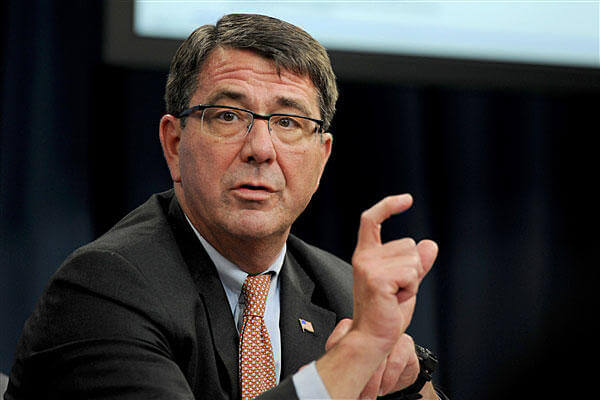Defense Secretary Ashton Carter said the U.S. military must overcome budget caps, embrace new technology and update its personnel system to remain the world's strongest fighting force.
"We are the best. But to stay the best, we have to embrace change. And that has several dimensions," he said during a speech Tuesday at an American Legion conference in Baltimore. "We have to be open to the wider world of technology. We need a sensible long-term budget that does right by our military and taxpayers and we need a 21st century personnel system to match a 21st century military."
Carter opened his remarks with a nod to his predecessor, former Defense Secretary Chuck Hagel, whom the Legion honored with its Distinguished Service Medal.
"Chuck was a soldier in Vietnam, stories of his bravery are well known," he said. "And throughout the rest of his life in public service, Chuck dedicated himself to those who served. And that's why he proudly wears the golden seal."
Vietnam, Carter said, "taught us the hard way, that while one may question why we fight, we must never question the honor of the men and women who do the fighting."
During a wide-ranging talk, Carter talked about the U.S. military's efforts to support allies in Europe to counter Russian aggression on the continent, rebalance more forces to the Pacific to limit China's push to expand its influence across the region, and fight militants affiliated with the extremist group Islamic State in Iraq and Syria, or ISIS, also known as ISIL.
Carter vowed that the U.S. "will deliver a lasting defeat to ISIL," and is "taking the fight to [the group] across the physical, virtual, and ideological battlespace." He said the coalition has carried out more than 6,500 airstrikes on group targets to seriously hamper its movements and operations and eliminate its leaders.
To manage or confront the various challenges regardless of location will require staying on top of ever-evolving technology and ensuring the services have the right people, Carter said.
"All of this -- having the best people, maintaining the best technology, and executing the best strategy -- takes resources," he said. "To support today's force and meet tomorrow's threats, we need long-term budget certainty."
Budget constraints, especially those imposed by automatic spending caps known as sequestration, have forced the military to make painful tradeoffs, Carter said.
"Our troops deserve better than the inadequacy of quick fixes and one-year -- every year -- crisis budgeting," he said. "Indiscriminate cuts from sequestration are wasteful for taxpayers and industries." These threaten American strategy, are unfair to the troops and "frankly, embarrassing in front of the world," he said.
Carter did not offer any details on some of the major personnel changes that may be in the works as part of his "Force of the Future" initiative. Some ideas have been proposed, he said, and DoD is "thinking many ideas through."
Draft proposals include ending the post-World War II "up or out" promotion system so that the military can hold onto qualified people even if they do not advance within the rank structure over a certain time, according to a column by Tom Philpott on Military.com.
Another idea is to establish for some officer and enlisted specialties technical career tracks that could be filled specifically by people with critical skills but who are not interested in moving into command or supervisory roles.
Still other ideas include dramatically increasing the percentage of women and minorities in the services and expanding parental leave to 18 months in all services. The Navy already has done this.
"We need time to get the best ideas and advice, both from our services and groups like the Legion," Carter said. "The people of U.S. armed forces are the best, and always will be the best, and how we manage them should be, too."
Carter also underscored DoD's commitment to its veterans. He said the department is expanding suicide prevention training to better spot warning signs and to quickly get help to people. He also said there is greater emphasis on ensuring those treated for traumatic brain injury or post-traumatic stress, both factors in risk of suicide among veteran, are able to continue their care as veterans through the VA.
The Pentagon is overhauling its electronic health records to improve interoperability across agencies.
Service members also will benefit from the Pentagon making counseling and financial planning programs available throughout time in service instead of scheduling them as people are getting ready to separate or retire, Carter said.
"You provide those vital services, too -- that's why we encourage VSO access to military," he said.
--Bryant Jordan can be reached at bryant.jordan@military.com.



























